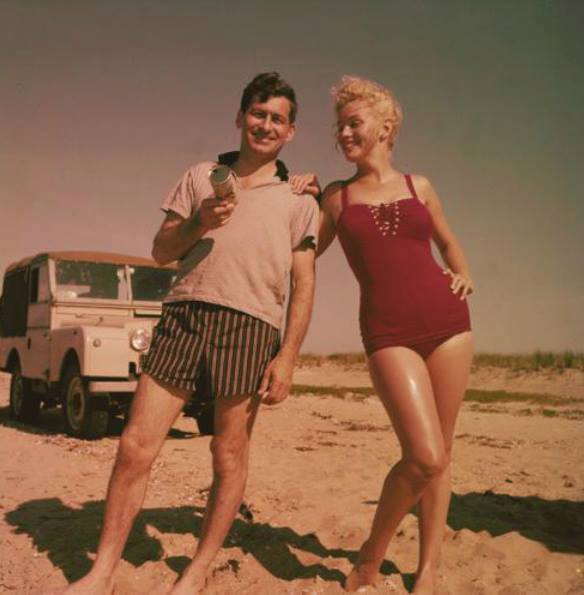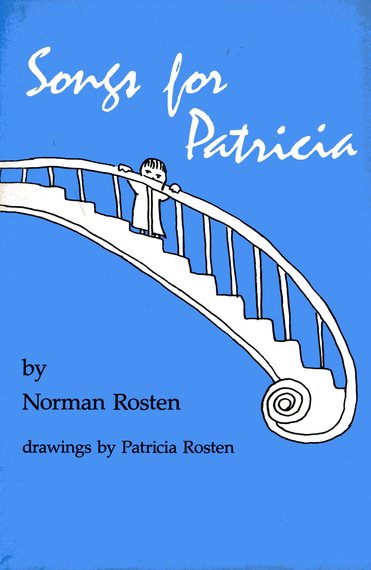
Norman Rosten (1913-1995), a poet and playwright dubbed the ‘Bard of Brooklyn’, was a friend of Arthur Miller from their college days at Ann Arbor in Michigan. He met Marilyn through another mutual friend, photographer Sam Shaw, in 1955. Norman and his wife, Hedda Rosten, soon grew close to Marilyn, and he was one of the last to speak with her at length the day before she died. Marilyn would bequeath $5,000 for the education of his daughter, Patricia Rosten, in her will.
In 1973, Norman published a memoir, Marilyn: an Untold Story, and he also provided the text for Sam Shaw’s pictorial tribute, Marilyn Among Friends. Sadly, Arthur Miller would never forgive Norman for going public (although Miller wrote about Marilyn in his own autobiography, and drew on her memory in several plays.)
Among Marilyn’s fans, however, Rosten is regarded as a ‘mensch’, and one of her few associates to emerge with much credit. In an article for the Huffington Post, the children’s author and illustrator, Melanie Hope Greenberg, shares her own fond memories of Norman.
“In the mid-1980’s I had read excerpts of a memoir about the iconic celebrity, Marilyn Monroe, in the New York Post. It was written by Monroe’s close friend, Norman Rosten, Brooklyn’s first poet laureate, novelist, playwright, and college friend of Arthur Miller, Monroe’s husband. I remember riding home on the subway and recognizing Rosten from his photo in the newspaper as we both departed the Borough Hall Station in Brooklyn Heights. I never dreamed that a few years later he and I would collaborate on a reissued book of poetry and publish a picture book together.
During the late 1980’s a community of writers and poets gathered in Brooklyn Heights at a children’s bookstore on Montague Street. Cousin Arthur’s Book Shop was a delightful resource in our neighborhood. The shop featured children’s events as well as poetry reading for adults … I officially met Norman Rosten at the front counter of Cousin Arthur’s where they gave away the free cookies.
During that time I was also a freelance graphics artist designing Cousin Arthur’s news and event posters. The Tramontes hired me to work on a book their poetry press planned to reissue and publish. Songs For Patricia, Rosten’s book of poetry for his daughter, was originally published in 1951. Norman’s teacher and poet friend had a print shop for book production at Wingate High School in Brooklyn. Norman and I traveled together and bonded during our ‘Wingate H.S. Adventure’. He was a ball of energy at 73 years old. I was more than half his age and out of breath chasing him up the school’s stairwell to the print shop.
Norman became a mensch mentor. He was grounded and did not take himself too seriously. He was wise and aware of the glories and pitfalls of fame. A kind neighbor and gentleman whenever I saw him on the street. I understand how Marilyn Monroe must have felt safe with Norman and acknowledged as an artist.”
While researching this story, I learned that composer Ezra Laderman, who collaborated with Norman on a Marilyn-inspired opera, died in March 2015. From Laderman’s New York Times obituary:
“Mr. Laderman (pronounced LAD-er-man), was a prolific composer of symphonic, chamber and vocal music, as well as a bevy of works for traditionally neglected instruments like the viola and the bassoon. But on account of its subject matter, it was Marilyn, commissioned to honor the 50th anniversary of the New York City Opera, that made him known to the general public.
Mr. Laderman’s eclecticism was on abundant display in Marilyn, which received its world premiere at City Opera on Oct. 6, 1993, with the soprano Kathryn Gamberoni in the title role. The opera, with a libretto by the poet Norman Rosten, was performed under the baton of Hal France; Mr. Laderman’s score fused tonal, atonal and serial elements with jazz, folk and pop motifs evocative of Monroe’s era.
The production garnered advance publicity round the world, with every performance sold out well ahead of time. The reviews were mixed at best, with some critics embracing the score for its stylistic range but others dismissing it as a pastiche.
In an interview with The Hartford Courant in 1994, Mr. Laderman was asked what lessons he had drawn from the critical response to “Marilyn.”
‘One lesson is that a lot of people apparently thought Marilyn Monroe was not a suitable topic for an opera,’ he replied. He added: ‘I disagree.'”
